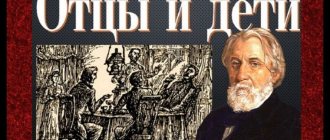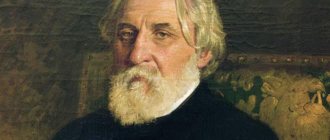Turgenev's mastery - time compression, laconicism, concentration of meaning, clear psychological portraits, not deliberate preaching, but precise formulation of questions - all this was best expressed in the novel "Fathers and Sons", written on the eve of the abolition of serfdom, at the time of the split of the intelligentsia into two parts: revolutionaries-commoners and aristocrats-conservatives. The much-wise Litrekon, in his analysis of the book, expressed the most important thing about the ideological and thematic diversity of the work.
History of creation
Who is the novel dedicated to? As you know, it is dedicated to the memory of V. G. Belinsky, a famous literary critic of that time. This dedication is not at all accidental, because Vissarion Grigorievich was the brightest representative of the new class, which loudly declared itself in the social and intellectual life of the country.
The struggle between the two classes, which forms the basis of the novel “Fathers and Sons,” can be traced in many aspects of the writer’s life. Sovremennik, which Nekrasov now owned, split into two parts - radical revolutionaries and adherents of gradual reforms. Dobrolyubov, a representative of the former, was supported by Nekrasov, which was the reason for Turgenev’s departure from the editorial office. Leaving was emotionally difficult, since this magazine was a kind of tribune for thinking people of that time.
Turgenev was distinguished by the fact that he created images of peasants and townspeople as deep and complex personalities. At the same time, belonging to the noble class, he was interested in the painful spiritual quest of the nobility. A very obvious question arises: who does the author sympathize with more? The first epigraph to the novel can help answer this question.
Young man (to a middle-aged man): You had substance, but no strength.
Middle-aged man: And you have strength without content.
This epigraph to the first edition was later removed, since it is clear from it that the last word belongs to the nobleman. This simplifies the author’s plan, making it one-sided, although in fact Turgenev sympathizes with Bazarov, he loves him and creates such a psychological portrait that the reader will fall in love with him. Bazarov's character reflected the traits of many radical democrats of that time.
The idea for the novel came to Turgenev in England, work on it began in Paris, and it was completed and published in Russia. In total, the writer worked on “Fathers and Sons” for 2 years - from 1860-1862.
It is also worth paying attention to the historical background. It was in 1859, in May, that Bazarov and Kirsanov came to the latter’s father on the estate. This is the moment of formation of a new political Russia - a split occurs: liberals-nobles and democrats-commoners. This is a time of a painfully borderline, crisis state of society. All of Russia is in the throes of transformation - no one wants to seem behind the new trends.
There is an economic crisis in the country, especially in the countryside - poverty, hungry peasants, devastation. Such pictures of his native land appear before Arkady immediately upon his arrival at his father’s estate. We soon learn that things are going badly with the Kirsanovs’ household.
In 1861 serfdom was abolished. It turns out that the age of the nobility is in the past? Is their “song finished,” as Bazarov says? Yes! And the author confirms this with the phrase:
My whole story is directed against the nobility as an advanced class. (From a letter to Sluchevsky)
Turgenev does not directly express his position in the text; instead, he invites the “cream” of the two classes to justify and defend their positions.
Lyrical line
Behind all this talk, it was somehow lost that “Fathers and Sons” is, among other things, also a novel about love. Kirsanov Sr. loves Fenechka, but is afraid to get married, because it may look reprehensible in the eyes of his brother. Brother, Pavel Petrovich, also loves Fenechka, but is afraid to show it, because in his own eyes it looks reprehensible. Bazarov falls in love with Odintsova, but is afraid to admit it for a long time, because he is too proud for this. Odintsova also loves Bazarov, but is afraid to accept his love, because she values tranquility too much, and with this man one can only dream of a quiet life. Kirsanov Jr. first falls in love with Odintsova, then with her sister Katya.
Still from the film "Fathers and Sons". 1958
Probably, a high school student is more interested in these love knots than I am. In my opinion, all this is very, very ordinary, universal. Why did Turgenev need it? Maybe for reasons of decency? Well, what is a novel, really, without this? Or maybe this whole love polygon was designed to show: Bazarov is a living person and nothing human is alien to him. He suffers, he is embarrassed, he is jealous, he is sad. Does this add anything to his image? In my opinion, the only thing is that no matter how hard he tries to portray himself as an iron man, a knight without fear or reproach, he doesn’t live up to it. And thank God it doesn’t fall short. Otherwise he would have looked like some kind of Alien or Predator.
Genre and direction
Genre: novel, originally conceived as a story. There really is a lot from the story - concentrating the action around one character, highlighting the climactic moments of the content, concentrated content, compressed time - all the action fits into 2 months.
Direction: critical realism. The uniqueness of the direction is that enormous influence is given to the inner world of a person, developing in society. We can trace the evolution of heroes exposed to new trends.
Bazarov and Nikolai Kirsanov
Arkady's father combined the best qualities of the Russian aristocracy. Excellent upbringing, kindness, delicacy are the main character traits. Kirsanov loves music, sees beauty and appreciates all the good things that fate gives him. The author feels sorry for the nobility that is becoming a thing of the past. It is being replaced by nihilism, but does it have a place in life? Can it replace the intelligence and education of the old class? Bazarov is against dreams, he is devoid of sentimentality and sensitivity. The author is sure of something else. Family and love will defeat callous calculation. Nobility will not allow insensitivity to fill the hearts of people. Perhaps that is why the Kirsanovs have a future. Both generations create families, and Bazarov remains only in the memory of those with whom he argued.
10 pages, 4670 words
Bazarov is a hero of his time. The hero's spiritual conflict. Can …
... thinks, works, moves, changes the world. Bazarov is a hero of his time. The spiritual conflict of the hero The novel “Fathers and Sons” was written in 1861 ... Eugene, the depth of his judgment and open hatred of slavery and lordship. Concluding the essay, I would like to note that the death of ... people is “rubbish, aristocratic.” A conflict is brewing between representatives of the old and new generations. The fight took place over evening tea. IN …
The images of representatives of the two generations evoke heterogeneous feelings. For some, Bazarov becomes a favorite character for many years. Someone admits that their elders are right. You can write an essay “Fathers and Sons: Rivals or Allies” using the example of the great classic’s novel using the information provided. Reasoning will help you substantiate your opinion and prove your point of view on the problem of many centuries.
Composition
The composition of the novel is based on antithesis. Based on the principle of contrast, the relationships between Bazarov and Pavel Petrovich, Arkady and Bazarov, the Kirsanov brothers, Bazarov and other “progressives”, the world of the nobility and the world of bureaucracy, etc. are shown.
The exposition of the novel is the paintings of Russia, seen by Arkady upon his return from St. Petersburg. The author immediately places the reader in the environment of that time, which helps us understand the context of the work, its historical background. This artistic device already makes us understand that the old world, despite its authority, cannot cope with Russia’s pressing problems, so a new force is coming to replace it.
As if on purpose, the peasants were all worn out, on bad nags.
Compositionally, the novel is divided into 3 parts - a statement of views, a test of strength, and death:
- The first part is the introduction of the antagonists - Bazarov and Pyotr Petrovich. Thanks to the accuracy of Turgenev's portraits and concentration on small gestures, we immediately understand their attitude to each other, and later they share their opinions, and we understand - Bazarov is a rude nihilist, Pavel Petrovich is an aristocrat.
- The second part is testing the heroes’ ideas for strength. Love, friendship, relationships with family. Will Bazarov's nihilism survive all these tests?
- The third part is summing up. The friends return to their father's village, where they finally move away from each other. Bazarov is left alone.
The features of the composition are a legacy from the Russian literary tradition. From Gogol in the novel there is a certain circularity in the movements of the characters. From Maryino, the Kirsanovs' estate, they go to Nikolskoye to Odintsova, then to the estate of Bazarov's father. Then this sequence is repeated again. During the absence of heroes in each location, they change noticeably. For example, Bazarov and Kirsanov leave Maryino as friends, but return already distant from each other, completely different people.
Essay 3
Perhaps the longest conflict is the struggle between children and their parents. And the writer Turgenev pays special attention to this problem in his work entitled “Fathers and Sons”
The plot of this novel lies in the conflict that occurs in one family between the old and young generations. The younger generation has its own values and principles and does not want to live under the dictation of its elders. After all, the older generation is accustomed to giving advice and pointing out how young people should live and act. This confrontation has lasted for many years, and continues to this day. Now young people completely ridicule the thoughts and actions of the older generation, and have completely ceased to respect their elders.
16 pages, 7503 words
Love is a delightful deception to which a person agrees...
... simple love. This is primarily due to the willingness to forget about oneself for the sake of a loved one. Asya does not live in the future... Love can change a person beyond recognition. Terence When you love, you want to do something in the name of love. I want to sacrifice myself. I want to serve. ... in which everything falls into place. They explain themselves to each other, and this leaves an imprint on the fates of both heroes. After that …
Some of the important heroes who participated in the conflict are Kirsanov and Bazarov. The character of Evgeny Bazarov is quite gloomy, he is detached from the world, but he still fights. He is hardworking and the manners of aristocrats are alien to him. He is quite smart and hates slavery. He is an independent person, incapable of being subject to the opinions of anyone, especially aristocrats. Bazarov is a strong personality. Kirsanov is a positive hero, he is a pedant. Tries to look neat and impeccable from all sides. He is a real aristocrat who does not like to work.
The young hero always tries to help people in everything. He solves their problems.
Kirsanov's hero defends and sides with the old regime. He belongs to the older generation. But Evgeniy, on the contrary, has a great desire to break this regime, to clear everything, before building. From the very first meeting, Kirsanov began to feel hostility towards Bazarov, and later he completely hated him. After all, the characters had completely different views on life.
The work also talks about Bazarov’s dispute with his parents. Although he loves his parents, he does not want to agree with their life principles and considers them stupid.
In addition to the conflict, the author also touched on the topic of love. The heroes also had different attitudes towards this wonderful feeling. Bazarov believed that love is something primitive. But his opposite hero can completely open his soul. Bazarov is described as cunning; his own principles were important to him.
The conflict between these two generations has spread to absolutely everyone. The older generation continues to think conservatively, but the youth always wants to move forward, they want to explore the world themselves, although they make mistakes, this does not stop them.
Other works: ← What is Mumu’s story dedicated to and what is it directed against↑ TurgenevStepan from Mumu’s story →
Meaning of the name
Why did the author name his novel this way? Above, we have not yet said a word about the literal confrontation between fathers and sons, that is, the younger generation and the older, although this is an eternal question. The younger generation, willy-nilly, denies the older one. This is the law of the negation of negation. That is, when the third generation comes, it will be an improved first. In the novel, the fathers are the elder Kirsanovs and Bazarovs, the children are Arkady and Evgeny Bazarov. This is a private conflict, represented by the differences between the Kirsanovs and Bazarov.
However, a private conflict flows into a global conflict. A conflict between two classes, where the fathers are the nobility, and the children are commoners. The heroes remain the same, but they are depicted against a large background of secondary characters. Odintsova and her sister Katya, Kolyazin, Kukshina are nobles, Sitnikov is a commoner. But the author allows the cream of the two classes to defend their interests: “If this is the cream, then what is the milk?” This can really be seen in the text, Bazarov is the cream, but Sitnikov is already the milk. The same is true with the elder Kirsanovs and Kukshina.
Thus, the title of the novel is ambiguous and, surprisingly, reflects 2 meanings at once. Conflict of generations and conflict of classes. This is the meaning of the title given by Turgenev.
Essay-reasoning 3
Perhaps the longest conflict is the struggle between children and their parents. And the writer Turgenev pays special attention to this problem in his work entitled “Fathers and Sons”
The plot of this novel lies in the conflict that occurs in one family between the old and young generations. The younger generation has its own values and principles and does not want to live under the dictation of its elders. After all, the older generation is accustomed to giving advice and pointing out how young people should live and act. This confrontation has lasted for many years, and continues to this day. Now young people completely ridicule the thoughts and actions of the older generation, and have completely ceased to respect their elders.
Some of the important heroes who participated in the conflict are Kirsanov and Bazarov. The character of Evgeny Bazarov is quite gloomy, he is detached from the world, but he still fights. He is hardworking and the manners of aristocrats are alien to him. He is quite smart and hates slavery. He is an independent person, incapable of being subject to the opinions of anyone, especially aristocrats. Bazarov is a strong personality. Kirsanov is a positive hero, he is a pedant. Tries to look neat and impeccable from all sides. He is a real aristocrat who does not like to work.
The young hero always tries to help people in everything. He solves their problems.
Kirsanov's hero defends and sides with the old regime. He belongs to the older generation. But Evgeniy, on the contrary, has a great desire to break this regime, to clear everything, before building. From the very first meeting, Kirsanov began to feel hostility towards Bazarov, and later he completely hated him. After all, the characters had completely different views on life.
The work also talks about Bazarov’s dispute with his parents. Although he loves his parents, he does not want to agree with their life principles and considers them stupid.
In addition to the conflict, the author also touched on the topic of love. The heroes also had different attitudes towards this wonderful feeling. Bazarov believed that love is something primitive. But his opposite hero can completely open his soul. Bazarov is described as cunning; his own principles were important to him.
The conflict between these two generations has spread to absolutely everyone. The older generation continues to think conservatively, but the youth always wants to move forward, they want to explore the world themselves, although they make mistakes, this does not stop them.
Essence and conflict
We found out above that the conflict has two aspects - the struggle of generations and the struggle of classes. It is noteworthy and remarkable that the struggle of two generations within each class is presented.
Let's compare the two classes using the example of the older generation. Here Bazarov’s parents are clearly losing, giving way to the older Kirsanovs. Nobility in ladies.
Now let's compare the younger generation - here the commoner Bazarov is clearly superior to all the young representatives of the nobility - Arkady loses to him in courage, intelligence and tenacity of positions. Kukshina is generally given as a kind of caricatured image to emphasize the inconsistency of nihilistic ideas in modern society.
Bazarov’s internal conflict plays no less important role. Some literary scholars, for example, Dmitry Bykov, generally put this conflict in first place. Indeed, as we see from the composition, the entire second part of the novel is dedicated to testing Bazarov’s ideas for strength, and in the third part we observe mainly the life of Evgeny. After firm confidence in his ideas, the hero meets with Odintsova, where he already believes that, perhaps, it is true that “every person is a mystery,” then he begins to engage in soul-searching, then he understands Pyotr Petrovich better, and then Bazarov dies. Nihilism couldn't stand it.
“I dreamed of a gloomy, wild, large figure, half grown out of the soil, strong, evil, honest - and yet doomed to destruction,” writes Turgenev.
Conflict between "fathers" and "children"
In the school curriculum, at least in my time, the main emphasis was on this. It was assumed that the “children” were more progressive than the “fathers”, that the “fathers” were stuck in the past era and were unable to comprehend the new time...
What can I say? Well, yes, there is such a conflict, and this is a completely natural thing - and not only for the psychological reasons that I have already written about. Another reason is social: life still changes and each new generation is formed in slightly different conditions than the previous one. Therefore, “fathers” poorly understand the thinking of “children” (and besides, they also poorly remember what they themselves were like in their youth), while “children”, due to youthful maximalism and lack of life experience, poorly understand the thinking of “fathers”. This was the case before the mid-19th century, and after, and is now, and will always be as long as humanity exists.
But, quite possibly, Turgenev was the pioneer here. At least in Russian literature. And not only did he describe the problem, he also showed two incorrect solutions to this conflict on the part of the “fathers.”
The first, most straightforward solution is, like Pavel Petrovich Kirsanov, to scold young people for being spoiled, for not living up to the principles of the older generation. Second, like Bazarov’s father, Vasily Ivanovich, fawn over his “sons,” adapt to them, and betray his principles. Pavel Petrovich looks stupid, Vasily Ivanovich looks pathetic.
By the way, the severity of this conflict during Turgenev’s time was much less than it is now, because now life is changing much faster. The economic structure is changing, the political system is changing, both mass and elite culture is changing, science is changing - and all this within the life of one generation. Today's "children" are much more different from their "fathers" than, say, thirty years ago. Looking from today, the 20s of the 19th century (the youth of the elder Kirsanovs) are practically no different from the 50s (the youth of Bazarov and Kirsanov Jr.).
But a generational conflict is not necessarily a conflict of ideas. Ideological conflicts in the same 19th century occurred precisely among the same generation (first of all, this was the confrontation between Westerners and Slavophiles - people of approximately the same age, social circle, education). An age conflict can be disguised as an ideological one, but the reason for such disguise is usually purely psychological.
The main characters and their characteristics
Image system
The system of images in the novel is built on antithesis. The contrast between fathers and sons, nobility and commoners. The author pits the characters in different situations to test their views. Also in the system of images there are secondary characters who serve as caricatures, as if a distorting mirror of the main characters. For example, Kukshina and Sitnikov are an indicator of the inconsistency of Bazarov’s ideas, their vulgarized appearance.
- The fathers include: Nikolai Petrovich and Pyotr Petrovich Kirsanov, Vasily Ivanovich and Arina Vlasevna Bazarov
- The children include: Bazarov, Arkady, Sitnikov, Odintsova and sister Katya, Kukshina.
- The nobles include: the Kirsanov brothers, Odintsova, Kukshina, Arkady.
- To the commoners: Bazarov, Sitnikov, Bazarov’s parents.
Kirsanov family
The depiction of a noble family is common in Turgenev's novels. The writer himself comes from the nobility, he sympathizes with the Kirsanovs, although he writes about them with slight irony. He knows their habits, manners, feelings. He loves them, even if he considers them not the advanced class of modern society. The key detail is that the novel presents the best nobles, as well as the best commoners.
Pavel Petrovich is an aristocrat, a “secular lion”, a firm and arrogant nature. It is entirely composed of principles, “principles,” as Pavel Petrovich himself would say. He is honest and fair, practical and has a high sense of self-esteem. He would never allow himself to have a relationship with a woman from a lower class, which is why it is so difficult for Nikolai Petrovich to admit to his brother his feelings for Fenechka. Pavel Petrovich is by no means the main bearer of noble culture (this role is assigned to Nikolai Petrovich), he is a bearer of European civilization, the customs of the common people are alien to him, and all his patriotism is quite superficial (when going abroad, he, for example, acquires an ashtray in the form of a bast shoe). His love for Princess R played a huge role in his life; for her sake, he sacrificed his career, and after breaking up with her, he felt completely devastated.
Nikolai Petrovich is the most lyrical of all the characters, good-natured and gentle. An esthete who loves Goethe, Pushkin, Schiller, plays the cello and piano, and appreciates nature - he evokes the sympathy of both the writer and the reader. As for his portrait, he was “lame”, with pleasant, slightly sad eyes. Even at 44 years old, he sometimes blushes and is ashamed a lot. He is the main representative of noble culture, it is he who is engaged in agriculture, communicates with the people, but things are not going well for him - he is completely impractical. Lilacs and acacias, with which Nikolai Petrovich dreams of planting his new home, are the most romantic flowers, widely used to depict a noble estate in Russian literature. In the novel, Nikolai Petrovich awaits that very simple happiness - family life with the housekeeper’s daughter Fenechka. He grieved for his wife for a long time and could not change her memory, but, having enlisted the support of his son, and soon his brother, he married Fenechka.
Arkady Kirsanov . Young Arkady looks like his father. He is sentimental, kind, romantic. His subtle soul loves nature and art. He has a fairly quick mind, not a strong, but harmonious character. Arkady very quickly succumbs to Bazarov's influence, but then he realizes that he is not a nihilist at all. Just think, he even believes in marriage.
“You still attach importance to marriage; “I didn’t expect this from you,” Bazarov tells him.
Arkady awaits the same simple family happiness as his father. She and Katya will get married on the same day, along with Nikolai Petrovich and Fenechka.
Evgeny Bazarov
Before they were just idiots, but now they suddenly became nihilists.
Bazarov’s philosophy is bold and terrible, denying everything in its path, and its name is nihilism. He denies any principles, foundations, traditions, authorities, public opinion. Love between a man and a woman is physiology; culture, religion, philosophy - “romanticism, nonsense, rot, art”; Man is a biological organism and nothing more.
People are like trees in the forest; not a single botanist will study each individual birch tree.
Let's talk separately about Bazarov's nihilism in the problems of the novel.
Bazarov’s prototype is a young provincial doctor who Turgenev once met. In him the writer saw barely emerging nihilism.
As for Bazarov’s character, he is courageous, full of “brute Mongolian strength,” energetic and strong in character. He is active and ready to fight, however, his whole problem is that he does not know what to fight for, first he “clears the place.” He utters this phrase in response to Kirsanov’s:
You deny everything or, to put it more precisely, destroy everything. But we need to build it.
Bazarov is always an opponent, he does not care about the opinions of others. In arguments with Pavel Petrovich, he is always calm, while his opponent is nervous.
Anna Odintsova
This character amazingly combines aristocratic origins and harsh life experience, external beauty and an inquisitive mind. She was cold and calm, full of some mysterious power. Even Bazarov, a nihilist, says after a month of dating:
Maybe, for sure, every person is a mystery. Yes, although you, for example.
It is Anna Sergeevna who shows Bazarov that “feelings bind no less tightly than violence and dictatorship.”
Nihilism and nihilists
Bazarov (like his younger friend Kirsanov) call themselves “nihilists,” from the Latin nihil, meaning nothing. This is how they formulate the essence of their beliefs: “A nihilist is a person who does not bow to any authority, who does not accept a single principle on faith, no matter how respectful this principle may be.”
It sounds very tempting, especially for young people, because there is an understandable psychological mechanism at work here: growing up, a person distances himself from his parents not only socially, but also emotionally. This alienation (usually temporary) serves as a protective mechanism for the psyche, softening the gap with the parental family. Some scientists believe that this has been working since ancient, prehistoric times. But since a person is still not a monkey, such emotional alienation must be somehow meaningful, receive some kind of rational justification. Hence the denial of authorities and principles, since these are adult authorities and adult principles.
It is this psychological mechanism that works for Evgeny Bazarov and especially for a very young boy, Arkady Kirsanov. From the text we see that young nihilists constantly want to shock the older generation, “troll,” as they would say now. In the days of my youth, Bazarov could have been called an “intellectual punk” - the hair does not stand on end, the dirt does not fall off in pieces, but the effect is the same.
Still from the film "Fathers and Sons". 1958
And, of course, this is typical of any era, including ours. Young people reject the opinions of their elders not only for ideological, but also for psychological reasons. If this circumstance is taken into account, then the notorious conflict between “fathers” and “children” can, if not be resolved, then significantly reduce its degree.
But we can talk about nihilism in essence, regardless of the personal characteristics of the nihilists. Is there some truth to their very idea? Of course there is. Blind, unreasoning acceptance of any authorities, agreement with any established opinions kills thinking. At the end we get either a fanatic with a burning gaze, or an opportunist like Griboyedov’s Molchalin.
What is wrong with nihilism? In the absolutization of this denial of authority. Because human thinking is designed in such a way that it must start from something. As a mathematician by training, I will say that any mathematical theory is built on two things: firstly, these are axioms (statements taken as a basis, without proof), and secondly, the so-called “rules of inference”, that is, ways of working with these axioms. And this is in mathematics, which everyone associates with the need to prove everything and everyone. This is especially true for everything else, where such rigor of reasoning is not required.
At first glance, nihilism may seem similar to scientific thinking. It is also based on the fact that nothing is accepted blindly on faith, any statement must be substantiated. Science is not only a body of specific knowledge, but also a methodology, that is, methods of obtaining knowledge. And the main method, at least in the natural sciences, is called “verification,” that is, verification. Did the scientist perform some kind of experiment and get new results? So, what is next? Do we unconditionally believe him, because he is an academician? Nothing like that! We conduct the same experiment in other laboratories, compare the results, and only if they are confirmed many times, we add new knowledge to our collection.
Nevertheless, scientific knowledge is still based on principles that are not questioned. For example, on the conviction that the world is fundamentally knowable by the human mind, that the world really exists and is not an illusion, a dream. The principle of verification of results is also a principle, and there is also the principle of falsification, formulated already in the 20th century (in a nutshell: if a scientific theory is constructed in such a way that absolutely everything can be justified within its framework, then this is anything, then it is not a scientific theory) .
Nihilism would thus destroy science. To doubt everything would mean that the scientist’s thought is stalled. Without accepting something as an established fact, it is impossible to move on. And in order to accept this something as an established fact, you need to be confident in the tools with which this fact was established.
In science, not everything in the world is denied, but only excessive limitations of thought; human opinions that are not supported by evidence are denied. A textbook example - somewhere in Aristotle it was said that insects have eight legs, and for centuries this was taken for granted, since Aristotle’s authority was enormous. Until someone thought of catching a grasshopper or a fly and counting the legs. This is the kind of blind faith that science rejects.
By the way, returning to the novel, I note that the main nihilist Bazarov does not at all pretend to equate his worldview with the scientific one: “I have already reported to you that I do not believe in anything and what is science - science in general? There are sciences, just as there are crafts, knowledge, but science in general does not exist at all.”
Topics and issues
The themes and problems of the novel are determined by conflicts, respectively, in the novel there are 2 main themes and at the same time problems - the theme of generations and the theme of class differences, on which the fairly voluminous problematics of the novel are built.
Confrontation between generations and classes
The theme of generations and the problem of misunderstanding between fathers and children . They are even reflected in the title of the novel. The new generation invariably denies the old, this is the law of life, and this is masterfully reflected in the novel. Every generation comes up with new ideas, which are mainly supported by the young. In the novel, a particularly poignant moment is the year 1860, the time of a real split in society, where not only fathers do not understand children, but in general no one fully understands anyone. A classic situation in the struggle of generations - some for foundations and principles, others for revolution and innovation. Two situations are indicative here - Arkady’s relationship with his parents and Bazarov’s relationship with his parents. Evgeny is really far from his parents, there is a gap between them - in views, education, positions. They themselves understand this, but they love madly, try not to bother and appreciate every minute spent together. Arkady denies, because it is fashionable to deny, yes, in some ways he sincerely disagrees with his father and especially his liberal uncle, but in fact he is like them - he recognizes authorities, believes in love, appreciates art. The difference between generations is actually not that big and striking; at the end of the novel, all the characters begin to understand each other better and better. Arkady understands his father and his relationship with Fenechka, Bazarov understands the internal tragedy of Pavel Petrovich, and even Pavel Petrovich begins to listen to Bazarov.
The theme of class differences and the problem of their collision . The global conflict of the novel is class differences. This is shown even through descriptions of clothing, portraits and speech; we will talk about this in more detail under the heading “Psychologism of the Novel.” Pavel Petrovich Kirsanov and Bazarov are antagonists. Aristocrat-liberal and commoner-democrat. One advocates gradual reforms, the second for urgent measures. However, Bazarov does not have any program, which distinguishes him from the populists of that time; he is not a revolutionary in the political sense of the word. His political position is quite vague and only filled with hatred of the regime. Kirsanov’s problem is ossification and unwillingness to destroy stereotypes in his head. The nobility has advantages - nobility, intelligence, experience, but does not have the desire for justice that democrats have.
Social and moral themes and problems are also presented in the novel.
Love
Love is one of the life trials that Bazarov faced in the second round of events in the novel. At first, he does not accept love, denies the meaning of marriage, and considers feelings between a man and a woman to be only a physiological need. But it is precisely his feelings for Anna Sergeevna that literally destroy his entire life concept. He understands that life is much more complicated than he imagines, he discovers that notorious “romanticism” in himself. Having met Odintsova, he is ready to give up loneliness, escape from it and completely surrender to love. However, he is refused, but does not humiliate himself in front of his beloved and leaves. Indeed, Bazarov could not be happy in love and marriage; this would mean a rejection of nihilism, the driving force of his personality. But unrequited love destroys Eugene from the inside, he begins to delve into himself, and this deep introspection makes him depressed. Before his death, he still asks for a visit from Odintsova, love dies with him.
Sad, destructive love plays a key role in the life of Pavel Petrovich; for the sake of love, he sacrificed both his career and status. The departure of his beloved Princess R is the main drama of Kirsanov’s life; after the breakup, he “could no longer get back into the same rut.”
Happy love, of course, is also present in the novel. Nikolai Petrovich was happy in his marriage, but, having become a widow, he could not betray his wife’s memory and remarry for a long time. However, having met Fenechka, despite the differences in positions in society, he marries her and remains happily married. Family happiness also awaits his son. Arkady falls in love with Katya, Odintsova's sister. They are both romantic, elevated personalities who love nature and music. Father and son got married on the same day.
Friendship
Numerous essays written on the topic of friendship between Bazarov and Kirsanov a priori make no sense. Bazarov, as a nihilist, denies the very concept of friendship. Their relationship can be called friendly, nothing more. Initially, their communication was doomed to collapse; Arkady “almost prays” for Bazarov, but at heart he is not a nihilist at all. The gap between their interests and characters soon leads to a final break between the friends. “He is predatory, and you and I are tame,” Katya sums up.
Nature and landscape
Nature is a powerful force, a symbol of eternity. The last scene of the novel, Bazarov's grave with flowers growing on it, personifies all the pettiness of a person before eternity. Nature has such power that no living organism can possess; all conflicts of humanity dissolve in it.
It is noteworthy that those heroes who were fascinated by the magical power of nature, who understood its beauty, find true happiness.
The landscapes of the novel are mainly pictures of an impoverished village. The image of the village with its hungry peasants and cows greedily devouring grass is also present in the exhibition. This helps immerse the reader in the atmosphere of that time.
Nihilism
If we put Bazarov’s personal conflict in the first place, as some literary scholars do, then the problem of nihilism comes to the fore. We have already found out that a nihilist does not recognize authorities and does not take anyone into account. But does he have his own opinion? Let's trace this through the characters' dialogues.
“There is not a single civil resolution in Russia that does not deserve criticism,” Bazarov declares. But Stalin’s “criticize and suggest” does not work in his case. We can only guess whether he has real political plans, because this side of Eugene’s life is deliberately not covered.
A source of pride for Bazarov is that “his grandfather plowed the land.” He feels close to the people, at least closer than the European Pavel Petrovich. By the way, he notes that Russia’s patriarchal nature and religiosity are undoubted advantages. Bazarov has a different opinion. Both of them, following Pushkin, must be thrown off the Steamboat of our time!
Psychologism of Turgenev
The appearance of the characters in Turgenev's novels plays a huge role in creating the character's image. He literally paints a psychological portrait of everyone from distinctive external features, clothing, gestures, and facial expressions.
See how he describes Bazarov at the very beginning of the novel, when the reader is not yet familiar with him:
A long and thin face, with a wide forehead, a flat nose at the top, a pointed nose at the bottom, and large greenish eyes. .<. .> calm smile, thin lips..
Plebeian origin (long and thin face), coupled with a calm smile and predatory green eyes and a pointed nose - we don’t need to know anything more about Bazarov. He was dressed in some kind of robe, which indicates his indifference to appearance.
Now it’s the turn of his antagonist, Pavel Petrovich. His facial features are regular, thin, clear, with incredible eyes. He was the embodiment of thoroughbred. The description of the clothes is given a lot of letters - this is important because it is important for Kirsanov. He is dressed (in the village!) in an English suit - which symbolizes good taste and aristocracy in his blood.
The speech of the characters characterizes them no worse than their portraits and indicates their position in society. Each hero has its own distinctive feature. Pavel Petrovich says “efto”, “princip”, often switches to French and speaks with “chilling politeness”. Bazarov speaks abruptly and aphoristically: “I don’t share anyone’s opinions, I have my own,” he also loves various proverbs and sayings, even if “his grandfather plowed the land,” he wants to emphasize his kinship with the people. So two heroes collide: one, infuriating with his unwavering politeness, the second with his abrupt intonations.
Bazarov's father, on the contrary, often wants to show that he belongs to high society and speaks very pretentiously. This seems funny.
The speech of ordinary men is full of abuse and mistakes, so Turgenev shows their lack of education and inability to be a full-fledged part of the revolution taking place in the country. In a class dispute, the people, as Nekrasov bequeathed, “keep silent.” A funny pun on speech.
Arkady “speaks beautifully,” which infuriates Bazarov so much. He loves ringing phrases and figures of speech. The dispute over language, by the way, was their first disagreement. It is fair to note that before his death, Bazarov also suddenly spoke beautifully: “Blow on the dying lamp.”
He is real?
I would venture to put forward a hypothesis: Bazarov is generally not the most typical representative of nihilism, although, according to Turgenev himself, he had real prototypes - doctors Dmitriev and Yakushkin, and in his working materials for the novel Turgenev draws parallels with more famous people, for example, Nikolai Dobrolyubov.
However, most of the real nihilists of that era were very different. As a rule, these were ardent young people who dreamed of “happiness for everyone, for free, and so that no one would leave offended,” naive idealists, who later either became embittered and became real revolutionary terrorists (Nechaevites, Narodnaya Volya), or matured and became cynical build your careers and fortunes. The virus of nihilism mutated in them, they really rejected the “principles”, that is, public morality, the commandments of religion, but, without particularly advertising their unprincipledness, they began to act wisely - and turned into a new political elite. This transformation, by the way, was brilliantly shown by Nikolai Leskov in the novel “On Knives.” Not all, of course (take Dobrolyubov), but many. And if we again draw parallels with modern times, we can easily see those sharks of business and politics who, at the turn of the 80s and 90s, were democratically minded young men with sparkling eyes.
If my guess is correct, then how to explain the dissimilarity of Bazarov to real nihilists? Maybe Turgenev didn’t know them very well at all, wasn’t particularly in touch with their circle? But the episodic figures of Sitnikov and Kukshina, local liberals, are shown in a completely Leskovian way. And Arkady Kirsanov, who also positioned himself as a nihilist, in general, looks quite vital.
Or maybe Turgenev was more interested not even in this artificially constructed Bazarov himself, but in the reactions of other heroes to him? And then Bazarov is a litmus test, a way to reveal such human types that are really significant for Turgenev, like the older Kirsanovs, like Odintsova... finally, like Bazarov’s parents?
I admit I don't have an answer. I am not so familiar with the life and work of Turgenev. It’s better to find out about this from specialists, but do I have the right to make a hypothesis?
the main idea
We have said so much that the reader must identify the main idea for himself. The decisive role here is played by the conflict that you put in first place.
If there is a conflict between generations, then the point of the book is to show the naturalness of this process, because after going through some difficulties, children begin to understand their fathers, and their ideological differences become trifles on the scale of their entire lives.
If the main thing for you is the conflict of classes, then the best representatives of both were put on trial for you, the author killed both. That is, the future will tell. Of course, Pavel Petrovich is alive and well in Europe, but he is “dead,” Turgenev writes about this unequivocally.
If Bazarov’s internal conflict with his nihilism seems more important to you than the others, then the main idea is that Evgeny is dying after all. A completely ridiculous death, it is only needed to show that nihilism is not yet possible. In Russian classics they will continue to develop the idea of nihilism, especially in the works of Dostoevsky we will find many new incarnations of Eugene.
Option 4
So, the “children” are Evgeny Vasilyevich Bazarov and Arkady Kirsanov. Bazarov graduated from the medical faculty of the local university. They are friends. External description of Bazarov - a tall, awkward man in a long robe with tassels. A thin face, a wide “Socratic” forehead, a pointed predatory nose, round green eyes and red sideburns, fashionable at that time, and thin lips. Dark brown long, thick hair is covered with a cap.
What conclusion can be drawn about a person with such a description? He doesn’t take care of his appearance, he’s secretive, he doesn’t like to show his feelings, he doesn’t endear him to himself, he’s always confident that he’s right, he’s smart.
Arkady Kirsanov also graduated from the university and is going to the village to visit his father. Turgenev does not give an exact description of it. Apparently it doesn't matter. Only one thing is known - he is a pleasant young man.
“Fathers” - Kirsanov Nikolai Petrovich. This is Arkady's father, a nobleman, who lives in his estate. He has land and 200 serfs. Originally from the southern regions of Russia, has a higher education. He did not serve in the army due to a leg injury that led to lameness. His father was a general without education. But in the family, Nikolai Petrovich’s mother commanded everyone. The woman lived for her own pleasure, managed all affairs - a kind of general in a skirt. Occasionally she remembered that she had children.
12 pp., 5694 words
Evgeny Bazarov: the image of the main character, Bazarov’s attitude towards others
... was the reason for the separation of Bazarov and Arkady Kirsanov? (Based on the novel by I.S. Turgenev “Fathers and Sons”) Show full text Evgeny Bazarov and Arkady Kirsanov, at the beginning of the novel by I.S. Turgenev “Fathers and Sons”, coming to Maryino, appear ... Bazarov and on the people's issue. This contradiction is revealed in the scene of a quarrel between young people in the hayloft, during which Criteria 3 of 3 K1 Compliance of the essay ...
The father did not pay enough attention to raising his children, so Nikolai Petrovich grew up as a frail, sickly child, did not fight with his peers, and read more and more. He was a kind, calm boy. He graduated from the university and married the daughter of an official. They lived in their family nest in love and harmony for 10 years.
They lived in perfect harmony, did housework together, and my father loved to read and go hunting. Arkady's mother died when he was still a child. The father himself took up the task of raising his son. Then he entered the university. And the father lived with his son in the city for the first two years of his studies. And then he returned back to the village. Now the son has finished his studies and is going to his father.
Bazarov spoke well about Nikolai Petrovich, he liked him. He called him “a nice fellow and a good-natured man.” And he added that poetry was clearly of no use to him in farming, which he knew nothing about.
Nikolai Petrovich has an older brother, Pavel, who lives with him. He is a retired officer, an old faithful servant. The duty and honor of an officer are above all for him. He was a man of forty-five years old, short in stature, with an athletic build. He loved English clothes, wore a fashionable tie and patent leather ankle boots.
Short haircut, bilious face, regular facial features, complete absence of wrinkles. The face has not yet lost traces of its former beauty. His black almond-shaped eyes gave him special expressiveness. In his entire appearance one could discern elegance and thoroughbredness.
It is clear that he did not like Bazarov at first sight. The exact opposite. He personifies everything that is so hateful to Pavel Petrovich.
Bazarov treated him indifferently. And he described him in a conversation with Arkady, a “village dandy.” Thank God, Pavel Petrovich did not hear this, otherwise he would have immediately challenged him to a duel.
There is also a beautiful young woman, Anna Sergeevna Odintsova. Gorgeous. She probably inherited her beauty from her mother; she was from an impoverished princely family. But the breed is visible, despite the thickness of the wallet. But, by the way, Madame Odintsova’s father successfully lost their family wallet.
But Anna Sergeevna successfully married a rich, older man. And after his death, she inherited his entire fortune. And she lived happily with her younger sister.
Bazarov easily evaluates people completely unfamiliar to him. What is it - courage, honesty in expressing opinions or self-confidence and biased attitude towards others? Or simply bad manners, the inability to forgive others for their weaknesses, callousness?
Conclusion
The moral of this story is:
- The problem of generations is eternal and that's ok. Against the historical background it is only more visible.
- Liberals or Democrats - the same damn thing, both are dead. Therefore, you cannot bet unambiguously on anyone; Russia is too powerful and diverse for unambiguous and drastic decisions.
- Love is a terrible force, capable of both destroying lives and saving them. This is what Turgenev makes you think about.
- Nihilism is a complex thing and it is not easy for nihilists to survive in society. Especially if you are honest with yourself.
We would venture to say that the novel will never lose its relevance, because the problem of generations is one of the eternal topics. There will always be fathers, and children too. And the entire problematic of the novel, with the exception of its socio-political part, is still applicable to modern society.
Burdock on the grave
I honestly admit: in my opinion, artistically, “Fathers and Sons” is not Turgenev’s strongest work. There is too much journalism here. However, towards the end of the novel the artistic component intensifies. I mean Bazarov's return to his parents' home and death from blood poisoning. The emotional intensity here is powerful, and I feel incredibly sorry not for Bazarov himself, but for his parents. In general, throughout the entire text, I feel sorry for them, because they madly love their son and because he is not able to perceive their love and respond to it. Calling him “callous” is an understatement. When I re-read Gogol’s “Taras Bulba”, I was very struck by the attitude of Taras and his sons towards his wife and, accordingly, his mother. But there it could at least be explained by the customs and conventions of that time. And our Evgeny Bazarov - he is above conventions, he behaves naturally.
Still from the film "Fathers and Sons". 1958
I don’t presume to say that he doesn’t love his parents at all, but the fact that he doesn’t know how (and doesn’t want) to respond to their love is a fact, it’s scattered all over the text. Whether the reason for this is his exorbitant pride (which the author specially emphasizes every now and then), or emotional deafness - I cannot judge. But this is not far-fetched, that it happens - it’s a fact. A fact of life for each of us. We often accept someone else's love as something natural, sometimes it even stresses us out a little, but we cannot respond with our own love. Or we don't know how. Or we don't want to. And then it's too late.
And then a burdock grows on the grave.
See also other materials from the series “School program for adults”:
Why didn't Masha run away with Dubrovsky?
“Fathers and Sons” - quotes for essays
". This doctor’s son was not only not timid, he even answered abruptly and reluctantly, and there was something rude, almost impudent in the sound of his voice. "
***
". Everyone in the house got used to him, to his careless manners, to his unsyllabic and fragmentary speeches. "
***
". It was only then that the whole bottomless abyss of Bazarov’s pride was revealed to him for a moment. "
***
“Since I’ve been here, I’ve been feeling really bad, as if I’ve read Gogol’s letters to the Kaluga governor.”
***
“It is better to break stones on the pavement than to allow a woman to take even the tip of a finger.”
***
“You have no reason to get excited, I don’t care at all. A romantic would say: I feel that our paths are starting to diverge, but I’m just saying that we’re tired of each other.”
***
“Like all women who failed to fall in love, she wanted something, without knowing what exactly. Actually, she didn’t want anything, although it seemed to her that she wanted everything.”
***
“In still waters. You know! You say she's cold. This is where the taste lies. You love ice cream, don't you?
***
". Bazarov's eyes sparkled for a moment from under his dark eyebrows. "
". He slowly ran his long fingers over his sideburns. "









